Published Jul 9, 2013
EXCLUSIVE: Star Trek Legend Harlan Ellison, Part 2
EXCLUSIVE: Star Trek Legend Harlan Ellison, Part 2
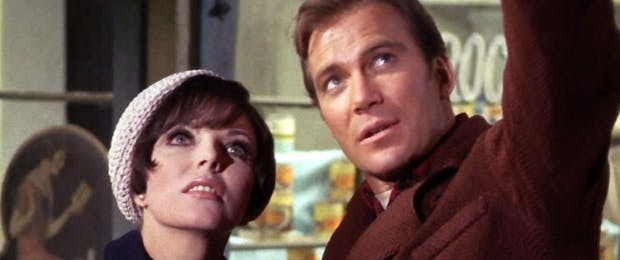
Harlan Ellison and Star Trek go together like hellfire and holy water. Ellison is an icon, a legend, an author whose name belongs on a sci-fi Mount Rushmore alongside Asimov, Bradbury, Heinlein, Clarke, Le Guin and Dick. Yet, to many people, Ellison will likely go to his grave as the man who wrote “The City on the Edge of Forever,” arguably the best-ever episode of Star Trek: The Original Series. Only, Ellison didn’t quite write the episode. Sure, it was his idea and he tapped out a couple of drafts of it, but several other Trek figures – including Gene Roddenberry, Gene Coon and D.C. Fontana – rewrote it to that point that Ellison requested that his name be removed from the credits and replaced with a pseudonym: Cordwainer Bird. His request was denied. The whole scenario has been a sore point, as well as a blessing and a curse, for decades on end.
Cut to last September. StarTrek.com ran into Ellison at Walter Koenig’s Star Ceremony and asked Ellison if he might consider an interview. Ellison said he’d think about it, and we chose not to push our luck. Then, surprisingly, the phone rang. Ellison himself offered to do an interview if we’d arrange for him to get a copy of his hysterical and potty-mouthed roast speech from the Koenig festivities. We made it happen and then decided to wait to talk to Ellison until the release of his latest book, 7 Against Chaos, a graphic novel which he collaborated on with Paul Chadwick and Ken Steacy. DC Entertainment will release 7 Against Chaos in comic stores on July 10 and on July 16 in print and e-book. And, sure enough, Ellison held up his end of the deal, spending the better part of a half-hour charming, cursing and curmudgeon-ing his way through a wide-ranging interview. Below is part two, and click HERE to read part one.
STARTREK.COM:You’ve been writing for decades. Has it gotten easier or harder for you to get words down on the page over the years?
ELLISON: It never gets easy. It’s a job of work, like bricklaying, that takes time and effort with what Balzac called clean hands and composure. You never stop writing. I dream in stories. I write them on a big piece of typewriter paper. It’s not a computer. I still work on a manual typewriter. Not even electric; a manual typewriter. After all these years, I only use Olympias. At night I’ll be in bed and type out the script of my life. All my life is a series of anecdotes. The great story of my life is my life. The image you must have, which is based on the fact that I’m no more or less filled with hubris than you are or than anyone else is, is that I’m like one of the survivors of that downed airplane on that Lost island, sitting on a beach, watching the waves roll in, breaker after breaker, and then suddenly turning around, looking behind me and realizing an entire continent has grown up.
Here I am, 79 years old, well past 79 years old. How I got here is all memory. It’s all the long trail. Sometimes that scarf that they drop on your shoulders when you become part of the human race is as heavy as chrome steel, just to be part of the human race and look at the news each night and see what asses we are and how we are capable of such grandeur and such nobility, and how we are basically so petty and savage.
STARTREK.COM: We have four Star Trek questions for you.
ELLISON: OK.
STARTREK.COM: For better or worse, you are forever associated with “The City on the Edge of Forever”…
ELLISON: As well I should be.
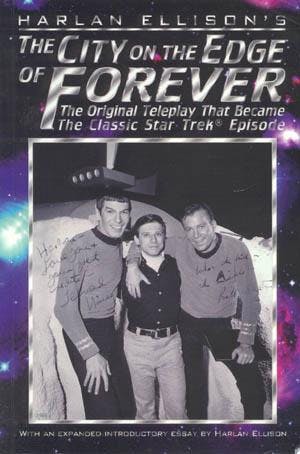
STARTREK.COM: Have you made your peace with the fact that you are?
ELLISON: Yeah, well, I did once I wrote my book about “The City on the Edge of Forever” (The City on the Edge of Forever: The Original Teleplay that Became the Classic Star Trek Episode) and published all the documents that proved what [Roddenberry] was saying I had done I had not done and that what I had done I had done. I won the Writers Guild Award with it. They’ve made all manner of tchotchkes and geegaws out of it. And the fact that Paramount and their heirs have made millions upon millions off me and I have made only thousands and thousands is something you learn to live with after, what?... 40 years. If you don’t learn to live with it, you are a petty person, and I live every day in hopes that I will be just a little bit smarter than I was the day before.STARTREK.COM: If someone, right now, offered you the opportunity to produce your “The City on the Edge of Forever” script exactly as you wrote it, would you let them? And do you think it would be better than the episode that bears your name?ELLISON: Yes, (he would let it be made). I think it would be smarter and deeper and truer to what the original idea of what Star Trek was when Gene Roddenberry came to my house and told it to me, when he told me he was proposing to do it.STARTREK.COM: Given your dissatisfaction with what happened on “The City on the Edge of Forever” it’s ironic that’s there’s that great photo of you sandwiched between William Shatner and Leonard Nimoy. How did that photo come about?
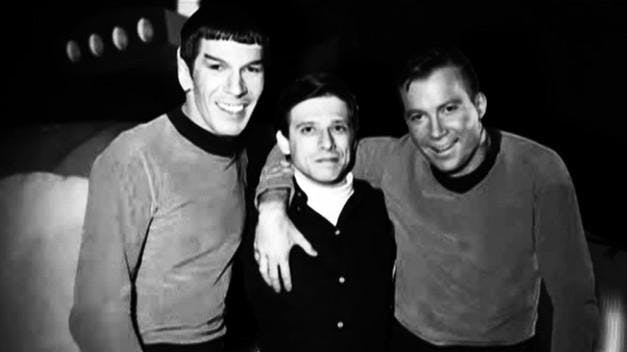
ELLISON:
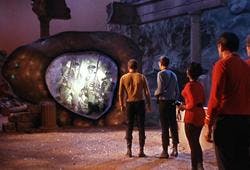
They hadn’t shot my episode yet. That was an earlier episode and I was still working on the script. I was on the studio lot. I had my own office, just down from Roddenberry. When I’d get tired of writing I’d crawl out the window, which was on the first floor, and I’d walk over to the set and I would hang out with grips and all. Leonard and I became fast friends very quickly. He said, “Come and take a picture with us.” So I said, “Fine.” I went over, and Shatner draped his arm around me and Leonard draped his arm around me, and we took the photo. Then I went back to writing “The City on the Edge of Forever.”STARTREK.COM: At the end of the day, since “The City on the Edge of Forever” is widely considered Trek’s finest hour and since the episode may have been the gateway to your other works for thousands and thousands of people around the world, has it ultimately been a good thing to have on your resume? Are you glad you did not manage to get your Cordwainer Bird pseudonym on there?ELLISON: Sure I’m pleased. Look, I have done everything I can do within human bounds to make the distinction between what aired and what I wrote. I did the book and people know the difference. So, having created the Guardian and having created that episode is a high-water mark that I can be when I’m good. STARTREK.COM: You announced three years ago that you were “dying.” You looked pretty good when we saw you at Walter Koenig’s event last fall. You sound pretty damn good now. Was that “dying” story a false alarm? Are you doing better now? Or is your demise just taking longer than you and your doctors expected?ELLISON: The long and short of it is this. In 2010, I was slated to go to Madison, Wisconsin, to do the MadCon ‘10 (convention) and I started to feel ill in a way that I couldn’t name. I just knew, like an old dog knows his time is near, that I wasn’t well. I was supposed to go to Cedars-Sinai (hospital) six days before I was supposed to go to Madison. And, three days before I was supposed to go to Madison, I called the people in Madison and said, “I can’t make it. I’ll be in the hospital. All you have to do is put up a big poster of me with my picture on it, and (set up) a microphone and say ‘Pay no attention to the man behind the curtain. I’ll answer all of your questions.’” I said, “Just put mikes out in the audience.”Well, the next day, the head of the convention showed up at the foot of my bed with 250 books that they had printed called Harlan Ellison: Unrepentant Harlequin. And he made me sign them. I was lying in bed, on the edge of which I’m sitting right now. I signed them. You soldier up and you do the job, which I’ve always done. People say how rude I am, how mean I am, how litigious I am. I was raised right by my mother and father. I’m a very polite person. I do interviews to help out whoever it is needs the interview done. And there he sat, and he brought up book after book after book. I signed all of them and I got so angry. The adrenaline rose in me and after he got back on the plane and went back on redeye with these bags of books I called and I said, “I’ll be there.” I managed to muster up the strength, and I went. Well, I had two seizures while I was there. I went blind in one eye, had to go into another room and put water on my face. I signed for over seven hours. Over seven hours. When I got back home I was in bed for a week. Then they took me to Cedars-Sinai and thereafter to another hospital. Just before that con, a guy called me from the Madison newspaper and he wouldn’t stop with the questions. Like you, you said you had four questions and this is now the sixth question. He said, “What was that all about? Was that a false alarm?” Finally, in exasperation, since I was going into the hospital the next day, I said, “Don’t you get it? What I’m saying is I’m dying here.” And he put it in the paper. So it went out viral: “Ellison says he’s dying.” You’ve picked up on that.
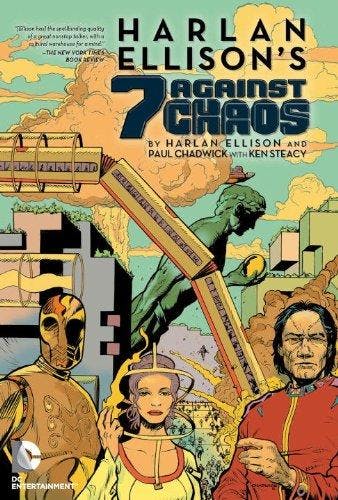
ELLSION: Now, since then, they’ve discovered that what I have is clinical depression and it got worse and worse and worse for three years, until they figured out that it was biochemical in nature and they put me on a spectrum of medicines. I am big pharma’s answer to the old W.C. Fields question “Is there a sucker born every minute?” I’m strong enough now to be able to give you this interview without more than one or two brain farts. My memory is intact. I had a physical a few weeks ago. I have no cancer. I have no prostate or heart trouble, but I’m as weak as a kitten. At around 3 o’clock they cut all the strings on me and, like a marionette, I drop over. So I go to bed. I go to bed at about 4 and I sleep until 10 the next morning. I’m doing the first signing I’ve done in three years for 7 Against Chaos. It’s why I’m giving this interview, not Star Trek. 7 Against Chaos. I’m doing that because it’s been 20 years in the making and I owe it to my partners, to Paul and to Kenny.
So I will do this signing on the 13th, the first I’ve done in 3 years. People will come in and without thinking they will demand autographs on 25 books. I will say, “No, I’m only signing a few things because I’m very weak.” They’ll say, “But I bought the book.” Then I say, “Yes, asshole, that’s what you bought… a book. That’s what you’re entitled to, a book. Not my smile, not my signature… You’re entitled to a book.” I will continue doing this until the road comes to an end and my feet go over the edge of the abyss and I go into whatever niche in posterity they have for me. I made it into the Encyclopedia Britannica, right between Ralph Ellison and Ellis Island. That’s pretty good for a poor little Jew from Long Island.
STARTREK.COM: Just to correct you on one thing, Harlan: we said we had four questions for you about Star Trek, not we had four questions left.
ELLISON: Yeah.
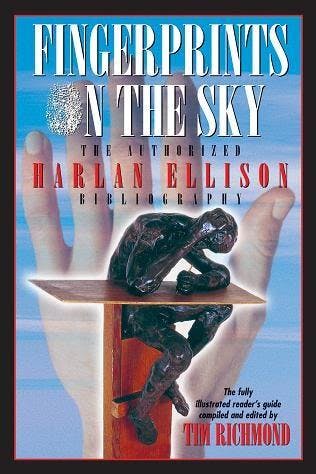
STARTREK.COM: Last two questions -- and we’ll fold them into one. What else are you working on right now? And what’s left on your bucket lists for your life and your career?
ELLISON: I have no idea. I am not prescient. I cannot see what’s in the future. I have got dozens of unfinished stories sitting upstairs on my desk. I have books that are half-finished. I have memoirs that are three-quarters finished. There’s a huge bibliography of all of my work that’s coming out called Fingerprints on the Sky, which is edited by Tim Richmond. Four or five other people have worked on it for the last 17 and a half years. It picks up where Leslie Swigart’s bibliography leaves off and fills in all that stuff before and after. I sent off a new book a few days ago. It’s called Li’l Six Gun Harlan and His Sidekick Carl the Comet in Danger Land. It’s a chapbook about an anecdote that happened with me and Carl Sagan many years ago in South Philly. It’ll be published Subterranean Press early this coming year. It’s a small book, but larger than the book of my quotations, Bugf—k.
It is of note that there’s a small renaissance in my work at the moment. I have had 19 books come out in the last 11 months. Nineteen books. If you go to Harlanellisonbooks.com and pull it up, you’ll see Harlan 101: Encountering Ellison. You’ll see four books of Brain Movies, which are my (unproduced) scripts. This is the work that I do. Sh-t, I’ve been on the barricades for 79 years, sucking up bullets. What am I working on now? Drawing breath!
Click HERE to read part one of our interview with Harlan Ellison.
